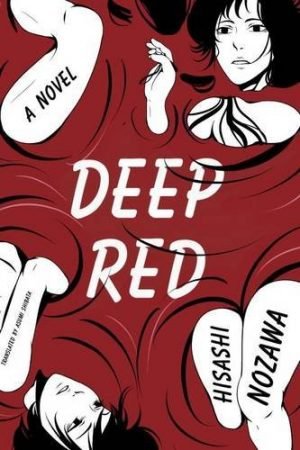
Even so, what she finds is beyond what she could have imagined – her parents and two younger brothers murdered, their heads caved in with a hammer, and the murderer Norio Tsuzuki found kneeling in a pool of the family’s blood in their own home. Despite her schoolmates and relatives’ reluctance to tell her anything about what happened and why, young Kanako begins to piece it together. Tricked into signing away his wife’s life insurance payout by Kanako’s father, Tsuzuki is driven to commit revenge in the most fitting way he can think of – by murdering his family. Found in the act, Tsuzuki’s confession expresses regret for the crime, but only for the deaths of the two young boys. According to Tsuzuki, the murders of the mother and father were justifiable.
After the confession in the second chapter, I questioned for a moment where Deep Red could possibly proceed. There’s a trend in Japanese crime fiction for early confessions, but a great detective refuses to accept it and unearths the truth. (The Tokyo Zodiac Murders is an example, as are some of the works of Keigo Higashino.) This formula is getting a bit overplayed, and thankfully Deep Red explores a different angle – that of inter-generational anger, and revenge.
Eight years after the murders that left her orphaned, Kanako is a college student in Tokyo. Meanwhile, the man who murdered her family sits on death row, his last appeal recently overturned, waiting for the day of execution. With the media revisiting the events that tore her family apart, Yukako decides to confront her demons, and digs through newspaper and magazine articles about the murders. Through the media she finds Norio Tsuzuki’s daughter, Miho – a woman her own age. Uncertain of her own intentions, Yukako seeks out Miho and begins a relationship of deception with her. With a false name and a false history, Yukako encourages Miho to face her own demons, setting in motion a chain of events she is eventually powerless to stop.
Kanako and Miho’s motivations are hard to fathom, particularly as the plot progresses. But Japanese literature is full of characters who deal with shocking situations in ways I would call strange – either extreme (such as murdering a whole family over a debt) or by performing meaningless actions (think of characters making spaghetti in Haruki Murakami novels). While this is great for getting a sense of how different people deal with traumatic situations, it creates a gap between you and the characters that makes them hard to sympathise with.
Hisashi Nozawa was more famous in Japan as a scriptwriter for TV, but also wrote a number of mystery novels before his suicide in 2004. Nozawa’s experience writing for television shines through in Deep Red, with a plot that shifts and builds like the best episodic drama. Publisher Vertical, which specialises in Japanese genre fiction (and features heavily in my Best of Japanese Crime Fiction special) can always be relied on to publish good, dark Japanese crime fiction, and I look forward to seeing more from them.
For more Japanese crime fiction, click here.
Vertical
Print
£18.99
CFL Rating: 4 Stars